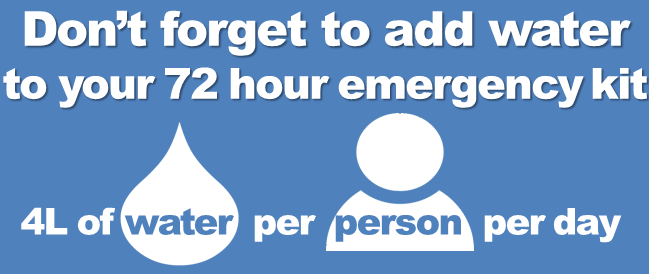As a resident of the University Endowment Lands (UEL), are you ready for a major disaster, like an earthquake, a wildfire, a severe windstorm, or a winter snow or ice storm? Do you have water, food, and other emergency items on hand if you were to lose your electricity, heat, or water supply for three or more days?
In the event of an emergency, it may be some time before you are able to access food or water from outside your home. For the safety and comfort of you and your household, it is prudent to plan ahead and have adequate food and drinking water for a minimum of 72 hours, or three days, on hand.
Buy Your Household Emergency Kit
There are many suppliers offering emergency kits for purchase, like:
| 72Hours |
| Costco |
Build Your Household Emergency Kit
| Build An Emergency Kit and Grab-and-go Bag - Province of BC |

In order to prepare, residents are encouraged to prepare and set aside 72-hours supply of drinking water as follows:
|
|
|
Please note that commercially-bottled water should be replaced every 6 to 12 months. Bottled water is not a sterile product, so it should be replaced on a regular basis to help ensure potability. Residents are advised to not store water in any bottle or containers that have previously stored any liquids other than water.
What risks exist within the UEL?
EarthquakesEarthquakes occur along the coast of British Columbia, and the region is overdue for a major one.
Landslides
Landslide risk along the perimeter of the Pacific Spirit Region Park increases after substantial rainfall.
Storms
Severe wind, snow, and ice storms can cut off power for several days.
Structural FiresA major building fire was the latest major disaster in the UEL. Fire is always a risk.
TsunamisAn earthquake can trigger an underwater landslide in the Georgia Strait, sending a series of giant ocean waves inland.
Wildfires
Drought increases the fire risk in Pacific Spirit Regional Park, which can potentially threaten nearby homes.
What are the potential consequences?
Power (electricity for appliances, lights, medical equipment, security systems, etc.) and heat (natural gas) may be out for several days. Do you have emergency power or fuel to keep your household secure and warm?
Communications (cellular and landlines networks) may not work or be very limited. Do you have a plan to reconnect your family if a disaster happens?
Water might not be available and sewer systems could be affected for weeks. Do you have an adequate emergency water supply at home, work, and in your car?
Transportation systems and routes could be inaccessible or changed. Do you and your family have sturdy walking boots at home, work, and school?
Older buildings could suffer major damage (chimneys and glass could be major hazards). What are the hazards around your home, if there was an earthquake or fire?
Health care systems will be temporarily overwhelmed (ambulances, hospitals). Do you have a first aid kit and is your family trained in first aid?
Evacuation may be required (fire risk, building damage). Do you have an emergency radio and know what radio stations to listen to?
Metro Vancouver Emergency Alert System
Metro Vancouver has the legislated mandate to protect the safety and well-being of all Electoral Area A residents through preparation and planning for various types of emergencies. Inhabited parts of the University Endowment Lands (UEL) are covered by Metro Vancouver’s Electoral Area A Emergency Management Plan.
Residents can prepare for emergencies by signing up for free emergency alerts from Metro Vancouver through Alertable. Alertable is a mass public alert system to help you and your family stay informed and safe during an emergency.Additional Resources
| Emergency Management BC |
| ShakeoutBC |